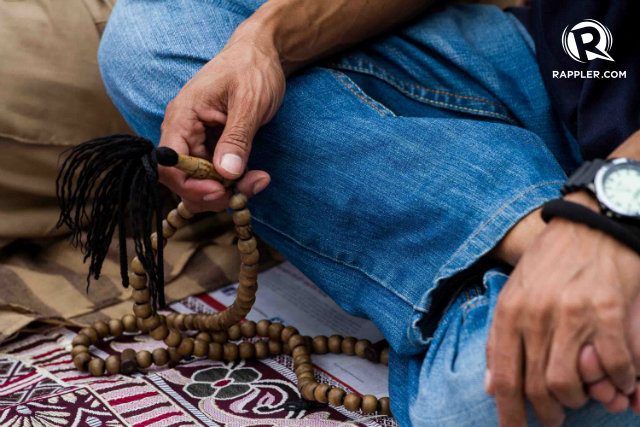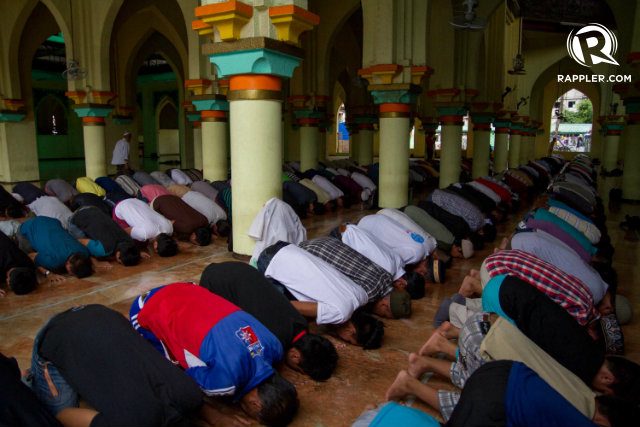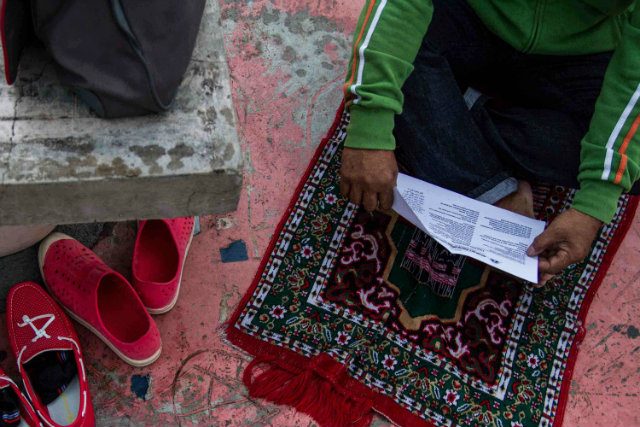SUMMARY
This is AI generated summarization, which may have errors. For context, always refer to the full article.

MANILA, Philippines – “I was born a Muslim. But I also believe, that since birth, I am gay,” said Kris*, a gay Muslim.
When Kris decided to leave Zamboanga City for Metro Manila to pursue his studies at the University of the Philippines (UP) Diliman, he was fully aware of his sexual orientation. He likes men, regardless of their religion and political beliefs.
“Since I was a kid, I knew something is different in me. I liked things that my father would forbid me to do, like playing with dolls, colorful dresses, and making friends with girls in our village,” Kris recalled. “My parents wanted me to become an Imam, to preach the words of Allah. But I chose to become what I wanted to be.”
When he entered UP, nobody knew him. Nobody knew he is Muslim, nobody knew he is gay. He said he feared being discriminated in what he perceived to be a Christian-dominated community.
“I was afraid of being judged because of my religion and of my gender,” he added.
The capital sin

It was Kris’ second year in college when he first engaged in a same-sex relationship. He felt that he began defying and denying his religion then. During that relationship, Kris did not practice Islam for almost two years.
He then had his first sexual experience with his non-Muslim boyfriend.
“I never told my first boyfriend I was a Muslim. I was worried telling him the truth will harm our affair,” Kris admitted. “I didn’t observe Ramadan and never went to fasting. I did my prayers when I was alone, but never when I was with him or with my friends. The only thing that I couldn’t really do is to eat pork.”
Despite of his “defiance” to his religion, he still hid deep in his closet, afraid that his family and the Muslim community would reject him.
“I cannot come out. I won’t. Our family belongs to an ethnic group in Mindanao, which is known to be machos, a tribe of warriors, and servants of Allah. They will never accept me. My fear hinders me from coming out and being free,” Kris explained.
Courage, acceptance

Kris then took a step back to reaffirm his faith. He read the Qur’an again, searching for the word of God, which he believed will give him the strength to overcome his fears and inhibitions.
He joined his brothers and sisters in fasting during the month of Ramadan to reinvigorate. He is practicing Islam again not to be a heterosexual man, but to find courage to come out.
“Islam is not the only religion that denounces homosexuality, even the Catholic Church, Iglesia ni Cristo, the Buddhist and other religious institutions,” said NurAinee Lim Ahmad, administrator of the Sarang Bangun Learning Center, an Islamic school in Zamboanga.
“Homosexuality was actually seen as a psychological problem decades ago. From a religious point of view, both the Qur’an and the Bible only states two kinds of human beings: male and female,” Ahmad continued.
Kris remembers every word of the Qur’an, which tells how Allah created men and women – a story that he once doubted to be true, asking God why he was born in a wrong body.
“If you will say that you are a man trapped in a woman’s body, you are insulting Allah,” said Ahmad. “God created you as a male, but you think he made a mistake of creating you otherwise. As human beings, we don’t have the right to judge. But we also have the right not to agree in that kind of lifestyle,”
Political, ethnic restrictions
Aside from his religion, Kris often ponders over his ethnic roots. He belongs to a clan in the Southern Philippines, which he thinks would never allow homosexuality.
He is a Tausug.
“There are 13 ethnic Moro divisions in the Philippines. Most of these tribes are warrior clans. They have their own political structure and tribal culture,” explained Japy Silapan, program Manager of Rare Philippines, a Southern Philippines-based non-governmental organization working on environmental development.
“Aside from following the teachings of Islam and the Islamic law, these ethnic groups have a strong policy and decree regarding homosexuality,” Silapan added. “We seldom hear of a gay Muslim going to an LGBT event and confess his choice of gender. It is because they respect their roots aside of their respect of Islam.”
However, not all ethnic groups that are primarily Muslim are religious. There is something in religion that is deeply rooted in culture and tribal laws.
Kris came from an ethnic minority that is still in its height of ultra-conservatism and feudalism, a culture which held him back from avowing his gender inclination. However, a radical university like UP contributed a lot to his ideology and beliefs; a change that took him years before getting enough courage to chase.
Taking the leap
The gay community respects religion and its teachings, according to Morphy Red, chairperson of the LGBT rights group Kapederasyon. He added that churches should also respect a person’s sexual orientation and gender identity.
“We should come out and let them see who we are. Prove to them that we deserve acceptance, that we are equal and we have rights, too. The state and the religion must respect every human being regardless of gender, age and beliefs,” Red argued.
Kris took the first step and let himself be exposed to a world he was trying to hide from his family, his religion, and his roots. In June 2015, he finally joined his first Pride March in Luneta.
“It was my first try to be in public as gay. However, no one knows me in that event. But the moment I stepped in that park to celebrate the Pride Month, I know I will have the courage to face my family and my religion in the coming days,” said Kris.
Kris hopes to someday achieve the happiness that comes with being accepted. By the end of the year, he plans to go back to his roots for a new journey in his life as a gay Muslim.
“I will try my best to explain myself to my family. I know it is hard for them to accept but I believe in the goodness of my religion,” said Kris.
“Islam is a religion that is forgiving and considerate. I am not sure what will happen the moment I publicly declare myself as gay but I will take my chances rather than forever be in the darkness of my own closet,” he concluded. – Rappler.com
*Kris is not his real name. The subject chose not to reveal his real name for privacy and security reasons.
Got stories to tell? Share your ideas and articles on religion, gender, and development with move.ph@rappler.com. Speak up on #GenderIssues!
Add a comment
How does this make you feel?
There are no comments yet. Add your comment to start the conversation.